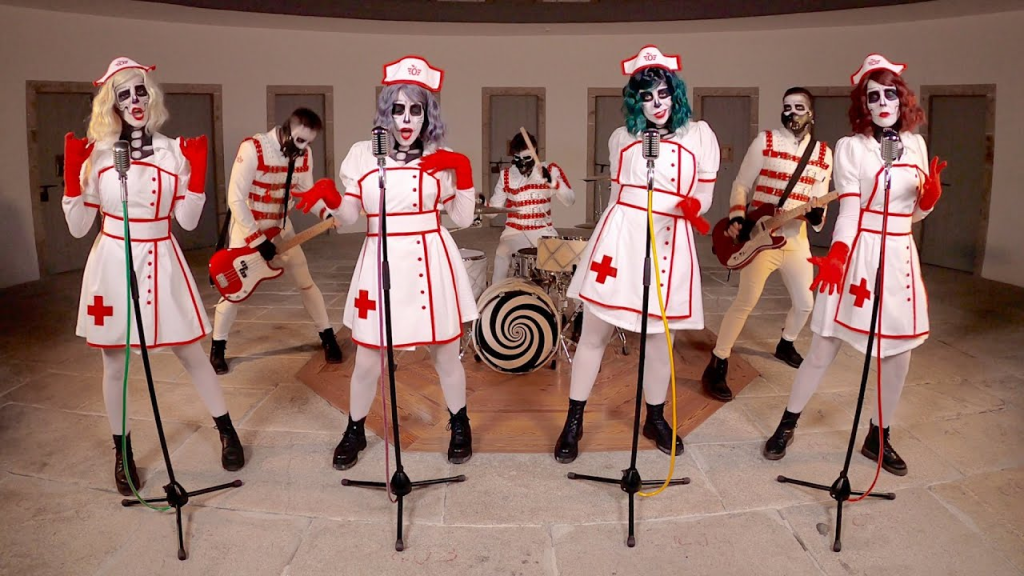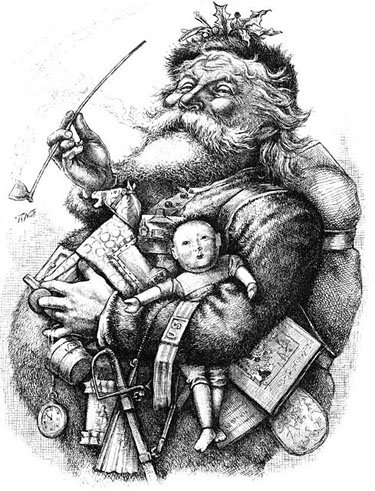
I enjoy limited quantities of the music produced by Broken Peach, a Spanish rock & soul band founded in Vigo in 2009. It consists of three men, and four women. The main reason for my appreciation is that they produce a Halloween and a Christmas special every year. YouTube appears to be their most important distribution channel.
Music is much like food. One appreciates some variation, but there are certain variants that are staples, while others are treats. I enjoy lemon pudding up to several times a year, but would prefer not to eat it on a daily basis. Some treats are seasonal, like Christmas pudding. Fortunately, it is not readily available in Norway, so I have not been subjected to it for the past forty years. In my childhood, the only way I was able to eat it, is to mix it with hard sauce, which is sugar by another name. So treats, for various reasons, can be too much of a good thing. Yet, I eat bread, almost every day.
I know several people (in Norway) who comment that November is the worst month of the year. It is so dark, without redeeming features. For us, at almost 64° latitude, it means finding and installing additional lights so that one can transform this darkness into light, preserving some degree of sanity. This dark season does not start until autumn is out of the way. Thanksgiving is part of autumn, officially celebrated on the second Monday in October in Canada, since 1957, originally in 1578 when English explorer Martin Frobisher and his crew held a special meal to thank God for granting them safe passage through northern North America into what is today the Canadian Territory of Nunavut.
Americans have other traditions. Many put Halloween (yyyy-10-31) and Remembrance day (yyyy-11-11) in the autumn category. Then comes Thanksgiving, the 4th Thursday in November, since 1941. For me, all of these are part of that dark season that some refer to as winter. I am uncertain when Spring begins, but I would want to include Valentine’s day (yyyy-02-14).
The above dates clash with the more official meteorological season start dates. These are based on the 12-month civil calendar and the annual temperature cycle. The key dates are the beginning of the month in March = Spring; June = Summer; September = Autumn; December = Winter. Another approach is to use the astronomical start dates, based on the position of the Sun in relation to the Earth. Here the dates can vary, but typically are March 19, June 20, September 22 and December 21. In the northern hemisphere, the darkest day of the year falls on the winter solstice, and it is important to have additional light centred around that date.
Note: I have never understood why the astronomical and meteorological dates cannot be coordinated. If one forgot to add leap years for 11 cycles = 44 years, the two dates would be reconciled, and the winter solstice would be at the start of the new year. The next leap year is in 2028. With it as the first of eleven cycles into the future, one would have coordinaed astronomical and meterological dates for the first time in 2072. Other calendars manage something appropriate. For example, the Baha’i calendar manages to start its year at the spring equinox as measured in Tehran, Iran.
Another factor has to do with latitude. On the winter solstice at Cliff Cottage, sunrise is about 10:23 while sunset is about 14:44 giving 04h20m of daylight. In contrast, in Vigo, Spain, there are 9h08m of daylight on the winter solstice.
The point here is that Broken Peach produces specials, that make the dark season survivable. The last Christmas special (2023-12-17) was Sleigh Ride. YouTube tells us it “is a light orchestra standard composed by Leroy Anderson. The composer had formed the original idea for the piece during a heat wave in July 1946, and he finished the work in February 1948. Its first performance was by the Boston Pops, Arthur Fiedler conducting, on June 7, 1948. The Ronettes recorded a cover of “Sleigh Ride” in 1963 for Phil Spector’s A Christmas Gift for You, which was commercially successful in the United States and featured in various media. The song has since been associated with the Christmas and holiday season.”
I limit my listening to Broken Peach to the period between the end of October and the beginning of January. After that, it is time to put them away for another year.
Would I want to attend a Broken Peach concert? The answer is no, not because I have anything against Broken Peach, but because I do not enjoy concerts. I enjoy listening to music in solitude, especially after my better half, a far better musician with a better understanding of music, developed a hearing disability, that prevents her from enjoying music at all.
One of the main reasons for listening to music using digital media, is that each individual can adjust his/ her sound, to suit/ match their hearing characteristics (within limits), and their mood. Concerts do not offer this luxury, and in my limited experience often pump out music at excessive decibel levels. These are far above what they should be, for people to be able to retain their hearing into old age, and add nothing to the musical experience.
Some music is, by its very nature, seasonal. Christmas music, even in societies in Europe and North America, where large numbers of people are irreligious, is the prime example. People listen to both secular and religious Christmas music according to some built in religious calendar, that lasts from Advent through the thirteen days of Christmas, ending – at most – close to the beginning of January.
Broken Peach claim to give a personal sound to each of the songs they perform, including some mashups. I find that an interesting choice of words, and not something I would say. I would substitute individual for personal. Yet, in this case, I may be the one who has an imperfect appreciation of the situation every band finds itself in. Each musician sings or performs using their own personal characteristics. This means that a group, much like an individual, has its own personality.
One of the reasons I don’t listen to symphony orchestras is that they lack personality. At times, a conductor will attempt to control this monster/ beast/ behemoth. My preferred term is leviathan, referring to the philosophical work (1651) by Thomas Hobbes (1588–1679) dealing with the political organization of society. In the end, a large orchestra show itself to be amorphous. For me, it is too large, and unfit for purpose.
Even when I am listening to classical music, I prefer smaller groups than a large orchestra. Ensemble is a generic terms for a musical group of indeterminate size. In general I prefer them to be octets (8 performers) or smaller. Chamber orchestras vary from 12 to 40; symphony orchestras can have up to 100 members. Broken Peach is a septet. It is a popular size for a jazz ensembles, since it allows for a wide variety of different instruments.
Yet, I am unsure of the voicing of Broken Peach. It seems fake. I am amazed that two guitars and a drum can produce all of the instrumental sounds an audience is exposed to. At the same time, having four singers seems like overkill.
One of Broken Peach’s best assets is their extravagant aesthetic/ costuming, which gives a visual freshness when one listens to them. Their version of Tainted Love appeared on 2021-10-21 as a Halloween special. It is very different from other version of the song that I have heard, although I find the aesthetics similar to that of Smashing Pumpkins. Their costumes add to the appeal of the song. Your kW usage may vary.
Another positive feature of Broken Peach that I appreciate, is that they don’t take themselves too seriously. They seem to be having fun, while making music. Listeners could follow their advice, and have fun listening to it. The track presented is mini-theatre, more than a mini-concert.
Visiting their website, Broken Peach write: Welcome to Brokenland! This was unexpected. No, I had not felt they should be welcoming me to Peachland. I had expected some promotional propaganda about their music. When I think of the adjective broken, it is less about something that is fragmented, and more about something damaged. It is something less than perfect.
The word smashing, as in Smashing Pumpkins, is much more interesting. Just restricting its use to that of an adjective, it can imply that those pumpkins are destroying/ wrecking something. Yet, my preferred meaning is that those musical pumpkins are magnificent.
Peachland vs Brokenland

… and now for two diversions: Peachland, followed by Broken Land.
According to Wikipedia, there are two Peachlands in the world, a district municipality near Kelowna, in British Columbia, and a much smaller village in North Carolina. I have some experience of the location in Canada, with my mother, Jennie (1916 – 2021) having lived her formative years in Kelowna, in the middle of the east bank of Okanagan Lake. I spent most of my summers to the east of Kelowna in Okanagan Mission, until the age of 16. Peachland, built on a northern slope where Okanagan Lake is at its widest, south of Kelowna, on the west bank of the lake. It is 1.5°C warmer than Kelowna in winter, and the same cooler in summer. Whenever I think of Peachland, I think of Rattlesnake Island, home of the lake monster Ogopogo, who lives there in a cave. It is now part of the 110 km2 Okanagan Mountain Provincial Park.

According to the same source, Broken Land refers to a song by Northern Irish band the Adventures, released on 1988-03-14, as the first single from their second album The Sea of Love. For me this album is interesting, because it has twenty nine different names listed as contributors, excluding producers Pete Smith and Garry Bell. Pat Gribben wrote Broken Land, and all of the other tracks on the album. It is not a track that I would want to listen to more than once. No, not because it is jarring, but for precisely the opposite reason. It attempts to be musically perfect, but ends up bland, tedious, boring, uninspired and sterile.
I would encourage those who appreciate the spirit of Halloween and/ or the Spirit of Christmas, to enjoy the music of Broken Peach as a seasonal treat!


